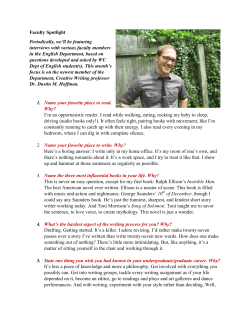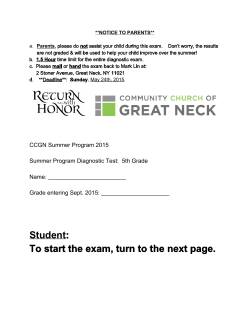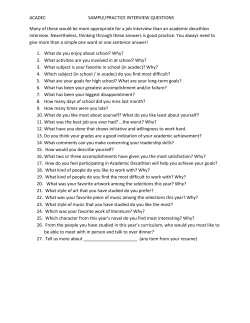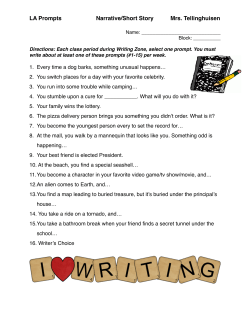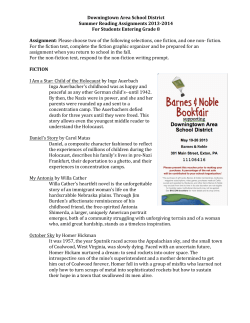
Assembling the Fiction Force
he t g n i l b m e s As ilson by Tucker W E ver since I was but a sprout of a lad, I have loved all things creative. While I had expressed interest (but not necessarily aptitude) in almost all forms of art, I always had the most interest in writing. I love fantasy stories with a passion matched only by my love for breathing, so of course I eventually began creating my own worlds for my original characters to romp and roam around in. Over the years I dived headfirst into any school writing assignment that offered even the slightest creative leeway and wrote small silly stories in my free time. Eventually, my yearning for the written word led me to take writing courses at CTY. I started with Creative Nonfiction and then The Critical Essay: Pop Culture. Then, last summer, I took my last-ever CTY course, Advanced Fiction, which was not only the class I had wanted to get into from the beginning, but also my favorite of them all. I arrived at Skidmore College in Saratoga Springs, New York, more excited for this class than I had been for anything in a very long time. I walked into the classroom and to my delight was reunited with a classmate from the previous year. We all immediately started introducing ourselves and learned the “Fiction Force, Assemble!” cheer that we would say in unison every day, out in public, before class. And then we discussed what we would do over the next three weeks: it would be a 30 imagine hardcore schedule of learning how to make great characters, give our stories meaning, use just the right amount of prose, and avoid horrific clichés, among other essential writerly know-how. Killing My Darlings Everything we did in that class, I relished. I attend a high school of around 50 students in a town of less than a square mile, so my experience with creative writing classes boiled down to plot worksheets and a final story limited to three pages. The in-depth nature of the Advanced Fiction course filled me with excitement. One of my favorite parts of the class was workshopping. Our class had only eight people, so everyone participated in one big group. Every Mar/Apr 2015 major piece of writing we created, whether it was one page or thirteen, went through the workshop, so they were a near-daily occurrence. My instructor, TA, and fellow classmates always had insightful observations about what could be done to improve my story, and they also gave Every day before class, members of CTY’s Advanced Fiction course (and their instructor) meaningful praise. My previous two writing raised their voices in unison for the writers’ rallying cry: “Fiction Force, Assemble!” courses had taught me to accept criticism of my work and also to give productive feedback on two of my favorite stories for the first time in that class: “A Good Man is the work of others. So despite being regularly astounded and somewhat Hard To Find” and “Interpreter of Maladies,” by O’Connor and Lahiri, intimidated by the quality of my classmates’ stories, I still felt that I was respectively. We even read a story from a book written by none other able to help them improve. than my own teacher. We avidly discussed all the stories we read: how At one point my teacher brought up the William Faulkner quote, the authors developed characters, how they explained plot elements, “In writing, you must kill all your darlings.” I had heard this quote and how they conveyed messages. I learned as much from these discusbefore. It refers to the fact that sometimes authors must give up some of sions as I did from actually writing. their favorite elements in a story in order to improve it. I never realized that I had a problem with that until my work was being reviewed by my classmates. Epilogue Specifically, I realized that I was subconsciously fond of storyline cliUntil taking Advanced Fiction, I had struggled to express my creative chés and that I was emulating my favorite writers too much. One story ideas through writing in a unique and polished way. I’ve always had I wrote involved a family of witches, each with unique powers, living a lot of ideas, but I was never able to put them on paper to my satisin a prejudiced community in Mississippi. After having it reviewed, I faction. Now I am confident in my ability to craft a story that I can be realized it was essentially blending elements of every young adult novel proud of. As a matter of fact, I wrote my favorite story, called “Snitch,” I had read. While I didn’t have trouble understanding that this needed from a relatively simple prompt I received in class (I believe it was to be fixed, it was a difficult thing to do. I had to keep a careful eye on something along the lines of “a plan gone wrong”). It’s about a young what I was using in my writings. It was hard to do something different man from Brooklyn who develops an obsession with behaving like an from what I would normally do, but it was a great help to my writing old-fashioned mobster and has to try to maintain his persona while in the end. dealing with the guilt of letting his best friend get killed—a big departure from a corny story about a magic family. Introduction to the Greats I will always remember my time as an active member of the esteemed The class entailed more than writing and workshopping, however. We Fiction Force. No matter where my life takes me in the future, I know read a lot more than I expected, and at first the sheer amount of it I’ll be ready to join it again should that rallying cry ever call me down was fairly overwhelming. But I soon realized how important it was. the beautiful, unpredictable path of the writer. n Despite being a voracious reader, I had largely limited myself to modern young-adult genre authors such as J.K. Rowling and Rick Riordan. While these kinds of books are amazing in their own ways, they are Tucker Wilson is a junior at Griswold High School meant for a younger audience. It is hard to find deeper, more poignant in Oregon, where he plays basketball and is active literary themes and techniques within the pages of Y.A. novels. in student government, FBLA, and Key Club. The readings for this course exposed me to the greats of the ficTucker loves reading (he’s currently enjoying Patton tion world. Some I had heard of but never experienced myself, such Oswalt’s Zombie Spaceship Wasteland) and doing stand-up comedy whenever he gets the chance. as Ernest Hemingway and Flannery O’Connor; others, such as Ha Jin and Jhumpa Lahiri, I had never heard of. I learned from them all. I read Learn more about CTY’s writing courses at www.cty.jhu.edu/summer and www.cty.jhu.edu/ctyonline. www.cty.jhu.edu/imagine imagine 31
© Copyright 2025
